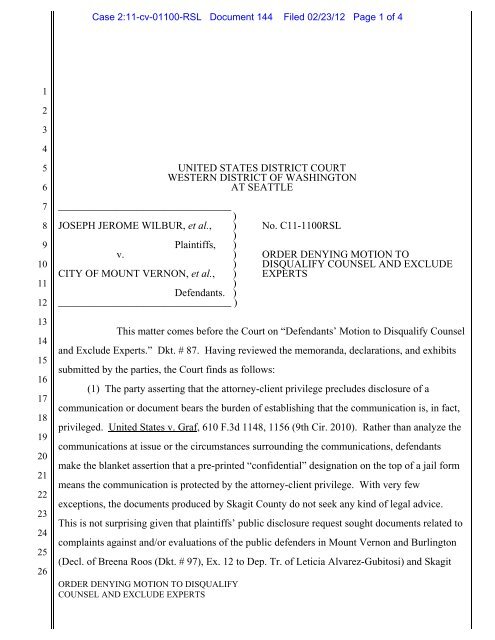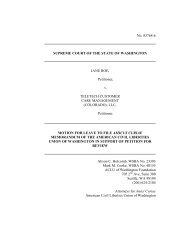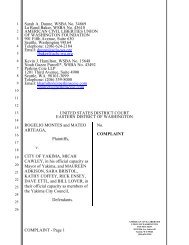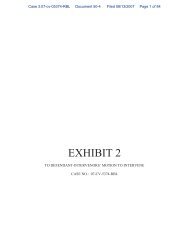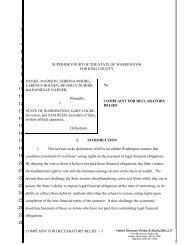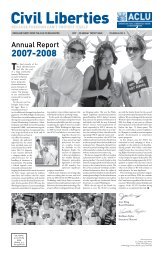order denying motion to disqualify counsel and exclude experts
order denying motion to disqualify counsel and exclude experts
order denying motion to disqualify counsel and exclude experts
You also want an ePaper? Increase the reach of your titles
YUMPU automatically turns print PDFs into web optimized ePapers that Google loves.
Case 2:11-cv-01100-RSL Document 144 Filed 02/23/12 Page 1 of 4<br />
1<br />
2<br />
3<br />
4<br />
5<br />
6<br />
7<br />
8<br />
9<br />
10<br />
11<br />
12<br />
13<br />
14<br />
15<br />
16<br />
17<br />
18<br />
19<br />
20<br />
21<br />
22<br />
23<br />
24<br />
25<br />
26<br />
ORDER DENYING MOTION TO DISQUALIFY<br />
COUNSEL AND EXCLUDE EXPERTS<br />
UNITED STATES DISTRICT COURT<br />
WESTERN DISTRICT OF WASHINGTON<br />
AT SEATTLE<br />
_________________________________<br />
)<br />
JOSEPH JEROME WILBUR, et al., ) No. C11-1100RSL<br />
)<br />
Plaintiffs, )<br />
v. ) ORDER DENYING MOTION TO<br />
) DISQUALIFY COUNSEL AND EXCLUDE<br />
CITY OF MOUNT VERNON, et al., ) EXPERTS<br />
)<br />
Defendants. )<br />
_________________________________ )<br />
This matter comes before the Court on “Defendants’ Motion <strong>to</strong> Disqualify Counsel<br />
<strong>and</strong> Exclude Experts.” Dkt. # 87. Having reviewed the memor<strong>and</strong>a, declarations, <strong>and</strong> exhibits<br />
submitted by the parties, the Court finds as follows:<br />
(1) The party asserting that the at<strong>to</strong>rney-client privilege precludes disclosure of a<br />
communication or document bears the burden of establishing that the communication is, in fact,<br />
privileged. United States v. Graf, 610 F.3d 1148, 1156 (9th Cir. 2010). Rather than analyze the<br />
communications at issue or the circumstances surrounding the communications, defendants<br />
make the blanket assertion that a pre-printed “confidential” designation on the <strong>to</strong>p of a jail form<br />
means the communication is protected by the at<strong>to</strong>rney-client privilege. With very few<br />
exceptions, the documents produced by Skagit County do not seek any kind of legal advice.<br />
This is not surprising given that plaintiffs’ public disclosure request sought documents related <strong>to</strong><br />
complaints against <strong>and</strong>/or evaluations of the public defenders in Mount Vernon <strong>and</strong> Burling<strong>to</strong>n<br />
(Decl. of Breena Roos (Dkt. # 97), Ex. 12 <strong>to</strong> Dep. Tr. of Leticia Alvarez-Gubi<strong>to</strong>si) <strong>and</strong> Skagit
Case 2:11-cv-01100-RSL Document 144 Filed 02/23/12 Page 2 of 4<br />
1<br />
2<br />
3<br />
4<br />
5<br />
6<br />
7<br />
8<br />
9<br />
10<br />
11<br />
12<br />
13<br />
14<br />
15<br />
16<br />
17<br />
18<br />
19<br />
20<br />
21<br />
22<br />
County subsequently focused its search “on kites that contained comments or complaints about<br />
the lack of representation <strong>and</strong> about disappointing levels of service being provided by the Public<br />
Defenders” (Decl. of Cori Russell (Dkt. # 100) at 6). Most of the kites produced by Skagit<br />
County are requests <strong>to</strong> speak <strong>to</strong> <strong>counsel</strong>, often accompanied by a summary of past failures <strong>and</strong> a<br />
dem<strong>and</strong> for specific action. No legal advice is requested. Of the almost 500 pages of kites<br />
produced by Skagit County (many of which are duplicates), defendants have identified only two<br />
that arguably disclose confidences <strong>and</strong> might be covered by the at<strong>to</strong>rney-client privilege. Decl.<br />
of Andrew G. Cooley (Dkt. # 88), Ex. A <strong>and</strong> Ex. C. With such a low percentage of the kites<br />
revealing anything that could be considered a request for legal advice, Skagit County’s general<br />
underst<strong>and</strong>ing that these forms were not privileged at<strong>to</strong>rney-client communication was<br />
reasonable.<br />
Nor have defendants shown that the communications were made in confidence.<br />
Plaintiffs have provided evidence that fellow inmates <strong>and</strong> the corrections officers had access <strong>to</strong><br />
the kites, that inmates had other, confidential means through which <strong>to</strong> contact their at<strong>to</strong>rneys,<br />
<strong>and</strong> that inmates were aware that the kite system was not confidential (regardless of the header<br />
printed on the form they were given). Defendants attempt <strong>to</strong> discredit this evidence by relying<br />
on equivocal testimony provided by Ms. Alvarez concerning jail procedures about which she has<br />
no personal knowledge. 1 Defendants have not met their burden of showing that the kites at issue<br />
are protected by the at<strong>to</strong>rney-client privilege.<br />
(2) Even if defendants had investigated the circumstances under which each kite were<br />
created <strong>and</strong> had shown that one or more of the forms contained a confidential request for legal<br />
advice, disqualification of <strong>counsel</strong> would not be appropriate here for at least two reasons. First,<br />
23<br />
24<br />
25<br />
26<br />
1<br />
The Court declines <strong>to</strong> strike defendants’ truncated summary of Ms. Alvarez’ deposition<br />
testimony <strong>and</strong> the related argument (Dkt. # 108 at 2), but has considered the additional portions of her<br />
testimony provided by plaintiffs in sur-reply.<br />
ORDER DENYING MOTION TO DISQUALIFY<br />
COUNSEL AND EXCLUDE EXPERTS -2-
Case 2:11-cv-01100-RSL Document 144 Filed 02/23/12 Page 3 of 4<br />
1<br />
2<br />
3<br />
4<br />
5<br />
6<br />
7<br />
8<br />
9<br />
10<br />
11<br />
12<br />
13<br />
14<br />
15<br />
16<br />
17<br />
18<br />
19<br />
20<br />
21<br />
22<br />
23<br />
24<br />
25<br />
26<br />
plaintiffs did not intentionally seek privileged information <strong>and</strong> could reasonably assume that<br />
documents produced by a government agency in response <strong>to</strong> a public disclosure request were not<br />
privileged. Plaintiffs’ own review of the documents would reveal little more than that the title of<br />
the form contained the word “confidential.” The content of most of the kites centered on<br />
complaints about the public defenders, not the procurement of legal advice. Not knowing how<br />
these forms were processed or what the inmates expected regarding confidentiality, plaintiffs<br />
could reasonably rely on Skagit County’s vastly greater expertise with both the kites <strong>and</strong> the<br />
privilege analysis in the context of a public disclosure request.<br />
Second, plaintiffs’ possession of the alleged confidential at<strong>to</strong>rney-client<br />
communications for purposes of this litigation does not in any way compromise or affect an<br />
inmate’s defense of his or her underlying criminal action. Plaintiffs have not gained an unfair or<br />
unjust advantage vis-à-vis the inmates or defendants in this matter, <strong>and</strong> the integrity of both the<br />
criminal <strong>and</strong> civil judicial processes are unscathed. 2<br />
2<br />
If these documents were privileged, it would be defendants’ possession of the kites that would<br />
be more troubling because defense <strong>counsel</strong>, representing the prosecuting municipalities, would be in<br />
possession of confidential at<strong>to</strong>rney-client communications regarding on-going criminal actions.<br />
ORDER DENYING MOTION TO DISQUALIFY<br />
COUNSEL AND EXCLUDE EXPERTS -3-<br />
Defendants apparently seek disqualification<br />
not because the fairness of this proceeding has been called in<strong>to</strong> question, but as a form of<br />
punishment for plaintiffs’ alleged unethical behavior or as a deterrent against future violations of<br />
the privilege. Defendants have not identified, <strong>and</strong> the Court has not found, any case in which a<br />
party is deprived of its chosen <strong>counsel</strong> purely as a sanction <strong>and</strong> not for the purposes of redressing<br />
or avoiding actual or perceived harm.<br />
(3) Plaintiffs have requested an award of fees pursuant <strong>to</strong> 28 U.S.C. § 1927, which reads:<br />
Any at<strong>to</strong>rney or other person admitted <strong>to</strong> conduct cases in any court of the United<br />
States or any Terri<strong>to</strong>ry thereof who so multiplies the proceedings in any case<br />
unreasonably <strong>and</strong> vexatiously may be required by the court <strong>to</strong> satisfy personally<br />
the excess costs, expenses, <strong>and</strong> at<strong>to</strong>rneys’ fees reasonably incurred because of such<br />
conduct.
Case 2:11-cv-01100-RSL Document 144 Filed 02/23/12 Page 4 of 4<br />
1<br />
2<br />
3<br />
4<br />
5<br />
6<br />
7<br />
8<br />
9<br />
10<br />
11<br />
12<br />
13<br />
14<br />
15<br />
16<br />
17<br />
18<br />
19<br />
20<br />
21<br />
22<br />
23<br />
24<br />
25<br />
26<br />
Section 1927 authorizes sanctions for the multiplication of proceedings <strong>and</strong> requires a showing<br />
of intent, recklessness, or bad faith. New Alaska Development Corp. v. Guetschow, 869 F.2d<br />
1298, 1306 (9th Cir. 1989); Optyl Eyewear Fashion Int’l Corp. v. Style Cos., Ltd., 760 F.2d<br />
1045, 1048 (9th Cir. 1985). If a <strong>motion</strong> is meritless, brought solely for tactical reasons, <strong>and</strong><br />
evidences bad faith, an award of fees is appropriate. Optyl Eyewear, 760 F.2d at 1048.<br />
The Court starts its analysis with the presumptions that an award of fees is not<br />
appropriate <strong>and</strong> that <strong>counsel</strong>’s conduct falls within the acceptable realm of zealous advocacy,<br />
untainted by bad faith. Nevertheless, after reviewing defendants’ <strong>motion</strong> <strong>and</strong> the related<br />
documents, the Court is concerned that defense <strong>counsel</strong> had only a weak factual basis for its<br />
claim of at<strong>to</strong>rney-client privilege, that he engaged in the same behavior as plaintiffs’ <strong>counsel</strong> by<br />
seeking these same documents, <strong>and</strong> that he waited until the allegedly privileged documents<br />
proved damaging <strong>to</strong> his clients <strong>to</strong> raise the issue. Defense <strong>counsel</strong> also sought the most extreme<br />
sanction for the alleged wrong apparently for tactical reasons. The Court is not, however,<br />
convinced that <strong>counsel</strong> intentionally raised meritless arguments – i.e., that he acted in bad faith<br />
rather than arguably overstepping the bounds of zealous advocacy – <strong>and</strong> will therefore hold this<br />
request for fees in abeyance. Future conduct in this litigation may illuminate <strong>counsel</strong>’s<br />
motivation in this matter.<br />
For all of the foregoing reasons, defendants’ <strong>motion</strong> <strong>to</strong> <strong>disqualify</strong> <strong>counsel</strong> <strong>and</strong><br />
<strong>exclude</strong> <strong>experts</strong> is DENIED. Plaintiffs’ <strong>motion</strong> for an award of fees is DENIED without<br />
prejudice <strong>to</strong> the request being raised again later in the litigation.<br />
Dated this 23rd day of February, 2012.<br />
A<br />
Robert S. Lasnik<br />
United States District Judge<br />
ORDER DENYING MOTION TO DISQUALIFY<br />
COUNSEL AND EXCLUDE EXPERTS -4-


